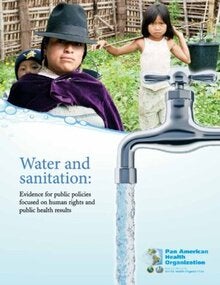Water and Sanitation: Evidence for public policies focused on human rights and public health results

|
This publication is part of the regional strategy of the Pan American Health Organization/World Health Organization (PAHO/WHO) on drinking water and sanitation. It is based on a review of the evidence conducted by the National Academy of Medicine in Buenos Aires, Argentina, at the request of PAHO/ WHO. Technical support was provided by Dr. Evelina Chapman, Coordinator of EVIPNet Americas, and by Paulo Fernando Piza Teixeira, Regional Advisor on Urban Health in the Sustainable Development and Environmental Health Area (SDE) of PAHO/WHO. An important reason for the preparation of this document was the need to produce evidence to guide decision-making and public policies that can ensure “health for all and by all,” an achievement that clearly will only be possible when all people have access to drinking water and basic sanitation. Another major motivation was the approval by the 64th Session of the United Nations General Assembly, in July 2010, of a resolution declaring access to water and sanitation as a human right. Lack of universal access to water and sanitation in the Region is a serious problem that jeopardizes the health of the population and the sustainable development of countries. For this reason, the implementation of public policies based on human rights is an important means to guarantee access to basic levels of water and sanitation services that enable people to live healthy and dignified lives. With this study, PAHO/WHO seeks to provide evidence to facilitate a deliberative, reason-based dialogue geared to building a new public health agenda, one that promotes universal access to water and sanitation and affirms the linkage between public health policies and fulfillment of rights for all. |
